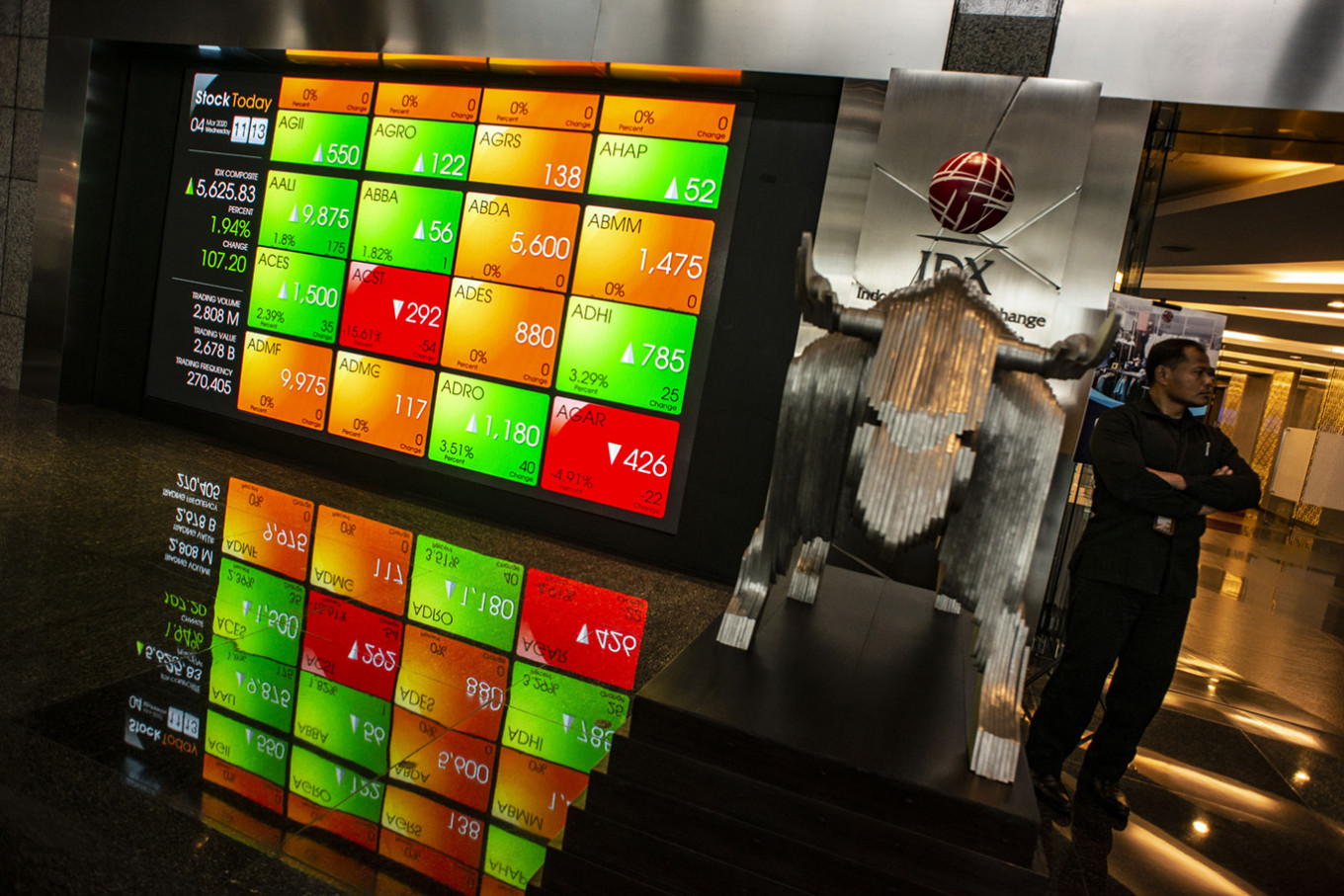Popular Reads
Top Results
Can't find what you're looking for?
View all search resultsPopular Reads
Top Results
Can't find what you're looking for?
View all search resultsJCI to continue bullish trend until Q1 2021: Analysts
The Jakarta Composite Index (JCI) has gained more than 25 percent in the last six months and around 11 percent in the past month following a slew of positive sentiments both from inside and outside the country.
Change text size
Gift Premium Articles
to Anyone
I
ndonesia’s stock market is expected to continue its bullish trend until early next year, supported by cheap stock valuations, low inflation and positive sentiments from both the domestic and global economies, analysts say.
The Jakarta Composite Index (JCI) has gained more than 25 percent in the last six months and around 11 percent in the past month following a slew of positive sentiments both from inside and outside the country, erasing some of the deep losses recorded during market crashes in March and April. The index lost 9.85 percent of its value so far this year, the third-best performer in the region.
The JCI has increased 0.7 percent to stand at 5,718.72 as of 12:12 p.m. Jakarta time on Thursday.
“The [JCI] uptrend will continue at least into the first quarter of 2021 as valuations are still reasonable compared to the five-year historical trend,” Aberdeen Standard Investment Indonesia investment director Bharat Joshi told The Jakarta Post in an email correspondence.
He was of the view that the positive outlook would remain at least until COVID-19 vaccines were deployed globally, spiking consumer demand that would spur economic activity.
Read also: Nickel, metals lead bullish rally in Indonesian mining stocks
The JCI’s price-to-earnings (PE) ratio currently averages at around 11 times. The figure is significantly lower than 29.14 times at the end of 2015. In addition to the strong rebound it recorded after being hit hard by fears of the COVID-19 outbreak earlier this year, the Indonesia Stock Exchange (IDX) has also seen an influx of foreign money in the past month.
The IDX recorded a total of Rp 7.82 trillion (US$555.1 million) in net foreign buy since late October after foreign investors went on a shopping spree for Indonesian stocks, such as privately-owned Bank Central Asia, state-owned Bank Rakyat Indonesia, state-owned telecommunications company PT Telekomunikasi Indonesia and gold miner PT Merdeka Copper and Gold.
That figure erased some of the bourse’s hefty net foreign sell to Rp 40.13 trillion as of Wednesday, after investors dumped risky assets earlier this year over fears of the pandemic’s impacts on the economy.
Foreign investors’ interest in Indonesian stocks is due to the fact that they are reallocating their funds into value and cyclical stocks like those of Indonesia, Joshi said.
“They are shying away from technology firms that have done well this year. So, it’s only natural that Indonesia would be the beneficiary of foreign inflows,” he said, adding that investors should favor stocks in the financial, commodities and property sectors during the current low-interest rate environment.
The Wall Street’s Nasdaq index, which consists of technology companies, gained 32.57 percent since the beginning of the year, as investors favored the stocks of technology companies during the early days of the pandemic and consumers began shifting their shopping habits online because of partial lockdowns.
Read also: Vaccine is no shot in the arm yet for emerging markets
Joshi, however, warned that the JCI’s rally and inflows could reverse should inflation start to increase, as the central bank would need to start raising their interest rate.
Separately, MNC Sekuritas analyst Herditya Wicaksana also warned market players of profit-taking risks that could weaken the JCI in the short term.
But he expressed his optimism that in the end, positive sentiments would remain stronger than negative ones, supported by the window dressing momentum in December, which could push the index even higher.
From December to January, asset managers often sell underperforming stocks and trade them with better-performing ones to improve their portfolios at the end of the year. Such a move usually results in stock market rallies.
“Historically, the JCI’s return in December is better compared to other months,” Herditya said.
This, coupled with the positive sentiments from the passing of the Job Creation Law, Joe Biden’s win in the United States presidential election, the hope of COVID-19 vaccines and increasing commodity prices, is expected to support the JCI to reach the 6,000 level in the mid- to long-term, he stated.
He suggested that investors look for stocks in the finance sector as they had supported the JCI’s growth so far this year.
Read also: Vaccine development to drive JCI’s Q4 performance: Analysts
The finance sector index has lost 4.23 percent of its value year-to-date (ytd), according to IDX data. The loss was the smallest compared to other sectors such as consumer goods, basic industry and chemicals, and trade and services.
“Stocks in the mining sector are also appetizing, especially after the rise in commodity prices and for commodities that are used to create green energy,” he added.
Mining is the only sector that has recorded gains at the domestic stock market with a growth of 3.6 percent so far this year, IDX data shows.










